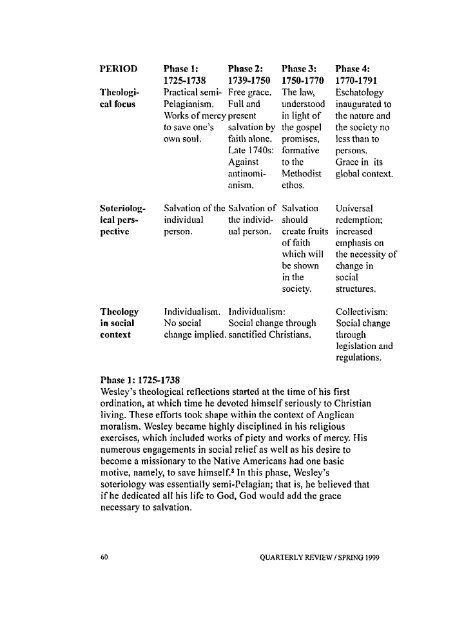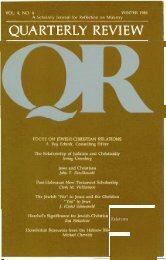Spring 1999 - Quarterly Review
Spring 1999 - Quarterly Review
Spring 1999 - Quarterly Review
Create successful ePaper yourself
Turn your PDF publications into a flip-book with our unique Google optimized e-Paper software.
PERIOD Phase 1: Phase 2: Phase 3: Phase 4:1725-1738 1739-1750 1750-1770 1770-1791Theologi Practical semi- Free grace. The law, Eschatologycal focus Pelagianism. Full and understood inaugurated toWorks of mercy present in light of the nature andto save one's salvation by the gospel the society noown soul. faith alone. promises, less than toLate 1740s: formative persons.Against to the Grace in itsantinomi- Methodist global context.anism. ethos.Soteriolog Salvation of the Salvation of Salvation Universalical pers individual the individ should redemption;pective person. ual person. create fruits increasedof faith emphasis onwhich will the necessity ofbe shown change inin the socialsociety. structures.Theology Individualism. Individualism: Collectivism:in social No social Social chang e through Social changecontext change implied, sanctified Christians. throughlegislation andregulations.Phase 1:1725-1738Wesley's theological reflections started at the time of his firstordination, at which time he devoted himself seriously to Christianliving. These efforts took shape within the context of Anglicanmoralism. Wesley became highly disciplined in his religiousexercises, which included works of piety and works of mercy. Hisnumerous engagements in social relief as well as his desire tobecome a missionary to the Native Americans had one basicmotive, namely, to save himself. 8In this phase, Wesley'ssoteriology was essentially semi-Pelagian; that is, he believed thatif he dedicated all his life to God, God would add the gracenecessary to salvation.60 QUARTERLY REVIEW / SPRING <strong>1999</strong>












